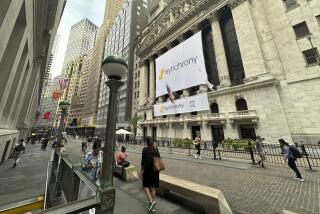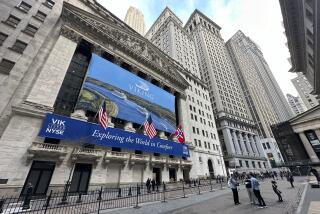Fed chair signals concern about coronavirus as scientists issue new warnings

WASHINGTON — With stock markets plummeting again Friday amid fears of a global coronavirus pandemic, Federal Reserve Chairman Jerome H. Powell sought to quell panic among investors, insisting the “fundamentals of the U.S. economy remain strong,” as the White House trotted out multiple officials who downplayed the risk to Americans.
But the upbeat message was once again undercut by stark warnings from government scientists and fresh concerns about what critics called the administration’s sluggish approach to testing for the new strain of coronavirus, also known as COVID-19.
An apparent lack of preparations has sharply limited how many Americans have been tested, feeding worries that the fast-spreading disease may be far more widespread than is known.
As of Thursday evening, only 459 coronavirus tests had been administered nationwide, according to the Centers for Disease Control and Prevention. The health agency has confirmed 62 cases in the U.S., including 45 in people who returned from coronavirus hot spots in Asia via State Department-chartered flights.
More than half the confirmed cases are in California. Health officials in Santa Clara County on Friday reported a second patient who had not traveled to Asia and appeared to have contracted the virus from somewhere in the community.
The first such community transmission was confirmed this week in Solano County, outside Sacramento, and the patient remains at UC Davis Medical Center. The two cases significantly raise the possibility of a wider outbreak in the state.
Nationwide, the number of infections is almost certain to grow, according to an editorial published Friday in the New England Journal of Medicine by Dr. Robert Redfield, the CDC director; Dr. Anthony Fauci, the director of the National Institute of Allergy and Infectious Diseases; and Dr. H. Clifford Lane, deputy director of the infectious diseases institute.
“We should be prepared for Covid-19 to gain a foothold throughout the world, including in the United States,” they wrote.
Dr. Nancy Messonnier, head of immunization and respiratory diseases at the CDC, stressed that the agency was aggressively tracing contacts of Americans sickened by the virus, including the Solano County patient.
In a phone briefing with reporters, Messonnier also promised that coronavirus testing kits are being distributed nationally after weeks of delays caused by flaws discovered in the existing tests.
“We have been testing aggressively,” she said, adding that the “immediate risk to the American public remains low.”
Messonnier had warned this week that it was inevitable more Americans would contract the virus, infuriating the White House.
The limited testing has fueled intense criticism of the administration from public health experts and lawmakers. Changing criteria about who should be tested have also forced medical centers around the country to scramble to adapt their protocols.
“It is still quite challenging on our end,” said Dr. Erica Shenoy, associate chief of infection control at Massachusetts General Hospital in Boston, one of 10 federally designated regional treatment centers for Ebola and other infectious diseases.
On Friday, Rep. Doris Matsui (D-Sacramento) sent a letter to federal health authorities urging them to expand and expedite coronavirus testing, citing an apparent delay in testing the Solano County patient.
The virus has stricken more than 84,000 people around the world and led to about 3,000 deaths.
In a rare statement, the Fed chairman weighed in at midafternoon after the stock market, which has cratered over the last week, appeared headed for another stomach-churning loss.
“The coronavirus poses evolving risks to economic activity,” Powell said. “The Federal Reserve is closely monitoring developments and their implications for the economic outlook. We will use our tools and act as appropriate to support the economy.”
The Dow Jones industrial average bounced back after Powell’s statement, but it still ended the wild day of trading down 357 points, capping the worst week on Wall Street since the financial crisis in 2008.
After the markets closed, the president delivered his own rosy assessment, crediting his border policies with limiting the virus’ spread in the U.S. and again suggesting he might extend travel restrictions beyond China, the epicenter of the outbreak.
On Friday, the State Department issued a travel advisory for Italy, warning Americans against nonessential travel to the country, which has been struggling with a coronavirus outbreak.
Despite Powell’s hint that the Fed might intervene, Trump complained that other countries were already acting to stimulate their economies and “our Fed sits there, doesn’t do what they’re supposed to be doing.”
Fed officials this week had seemed unruffled by the abrupt sell-off and said current monetary policy was in a good place, suggesting they would not cut interest rates anytime soon.
But as the losses mounted, many on Wall Street have called on policymakers to intervene.
As stocks nosedived early Friday, Larry Kudlow, Trump’s chief economic advisor, came out of his office to speak with White House reporters. “Given what we know factually, it looks to me like the market has gone too far,” he said.
The Fed’s main interest rate is already low, about 1.6%, and analysts say that even if officials were to lower it by a quarter- or half-point, it isn’t likely to be more than a temporary balm.
The Fed could announce an emergency cut at any time or elect to wait until its next scheduled policy meeting in mid-March.
“A Fed interest rate cut won’t make sick people well, it won’t get consumers worried about getting sick to go to restaurants or the movies, and it won’t fix the disruption in global supply chains,” said Greg McBride, chief financial analyst at Bankrate.com. “However, it will pander to markets, and that is often all the reason the Fed needs. The only question is if they can wait until the March 18 meeting or if they do so beforehand.”
Earlier Friday, Mick Mulvaney, the acting White House chief of staff, sought to pin blame for the health crisis on the media.
“The reason you’re seeing so much attention to it today is that they think this is going to be what brings down the president,” he said at the Conservative Political Action Conference just outside Washington. “That’s what this is all about.”
“What I might do today to calm the markets is tell the people to turn their televisions off for 24 hours,” he said.
Mulvaney tried to minimize the fatality rate — somewhere near 2% — as far less than other infectious diseases that have created scares.
“Is that serious? It absolutely is. There’s no question about it. But it’s not a death sentence. It’s not the same as the Ebola crisis,” he said.
“Are you going to see some schools shut down? Probably. May you see impacts on public transportation? Sure. But we do this. We know how to handle this,” he added.
More to Read
Get the L.A. Times Politics newsletter
Deeply reported insights into legislation, politics and policy from Sacramento, Washington and beyond. In your inbox three times per week.
You may occasionally receive promotional content from the Los Angeles Times.













